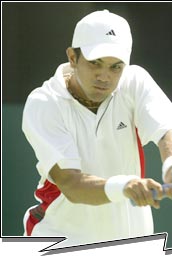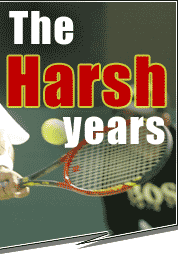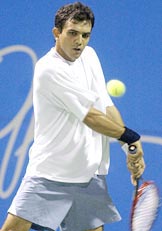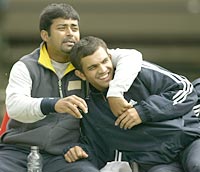

In tennis, life does not end at beating Andy Ram or a much higher-ranked Jamie Delgado. It begins there; making it to the main draw of a tournament, thinking of the first, second, third rounds and ahead. Then hopping on to the next destination on the schedule.
Shedding the limited reserves of money and picking up self-doubt can torture the seemingly endless journey. Few find courage amidst the struggle to stay loyal to their dreams. Harsh Mankad does.
"It is very difficult. You are talking 30,000 to 40,000 dollars every year and you have to travel round the world. After six months (of continuous touring) it almost gets too much," says Mankad, sitting in the players' pavilion after the conclusion of the ITF-MSLTA Futures tournament in Mumbai.
He is not big, neither is his game. The serve is getting better and his game more prepared to follow the instincts. But it is the fight keeps him going.
On the court, he remains mostly inexpressive. A quick pump of the fist or a smirk serves fine, never throwing abuses and rarely confronting the umpire.
At 349, he is the highest-ranked Indian in the latest ATP ranking list. On the face of it, it may be nothing to shout about. But we need to understand that it is a mark achieved in a global sport, without much backing and in a system that only stumbles upon champions.
Mankad speaks about the missed opportunities and the ones he grabbed. He knows there are players out there who are better than him and can beat him on a given day, but he would rather focus on how best he can counter them.
Being cricket legend Vinoo Mankad's grandson, son of former India batsman Ashok and former Asian and national tennis champion Nirupama Mankad did not guarantee him success on the platter. He understood that and set out to add a footnote to the impressive lineage.
As a student of the Campion high school in south Mumbai, Mankad played all sports. He impressed at cricket and played as a forward for the school's hockey and football teams.
"I had a good sense for sport. As a kid I wanted to play cricket. That was the first option. To me team sport is a lot of fun. But my parents didn't really encourage me to play cricket. My brother was playing tennis; my mother had more free time so I started playing tennis. Tennis was really where I had organized training."
So when he started winning consistently at tennis at the state and national level, cricket was left in the gullies and football on the school fields.
At 18, he was the best junior player in India. Instead of jumping into the professional league, he sought a university education in the United States of America. He earned a sports scholarship at the University of Minnesota to hone his skills under better coaches and facilities.
 "It was a good change from India. I went there when I was 18; I was the number one junior in the country but there was no support for me at that time to play. I just felt that I couldn't play the professional tournaments. I didn't have the money, the resources to do that.
"It was a good change from India. I went there when I was 18; I was the number one junior in the country but there was no support for me at that time to play. I just felt that I couldn't play the professional tournaments. I didn't have the money, the resources to do that.
"College was a good second option where I could continue playing at a good level and also get an education and get that experience. There's also more to life than tennis when you are in college. In hindsight, it was a good thing. My game wasn't ready for professional tennis, so college allowed me to practice a lot and improve."
By the end of his stint at Minnesota, Mankad had become the number one college player in the US by winning the National inter-collegiate indoor championship.
In June 2001, he won his first professional title at the $10,000 Canada F1 Satellite tournament, defeating Lazar Magdincev of Macedonia 6-7(6), 6-3, 7-5. It was the first pro title for an Indian outside the subcontinent after Leander Paes' triumph in Newport in July 1998.
The Davis Cup was waiting.
"Growing up in Mumbai I didn't go to any Cup matches. I knew it was a big deal in India, but never really felt what it really is. I always thought of playing on the tour but now I have grown to appreciate it. Someone like Leander always plays his best tennis in the (Davis Cup) tournament, so it is a great experience to play for your country. It's not about more pressure because it is a tennis match at the end of the day; that's how I like to see it."
Mankad was first selected on the India team in 2000, to play Sweden in Bastad. Two trips later with the Davis Cup team he was up against Andy Roddick and James Blake on the fast American courts. Then came ties against New Zealand and Australia.
"It was a little overwhelming at times playing (Lleyton) Hewitt in Australia and Roddick in America. I really didn't have the same performances that they had on tour and to jump into that situation in Davis Cup was very difficult. I've been on the team for four years but I have played all (13] the matches away.
"That time I didn't really believe that I could beat him (Hewitt). I am not saying that now I can beat him, but I just believe that if I happen to play good tennis I can beat anyone. That's at least the feeling I have."
After a satisfactory 2003, he failed to win any titles the following year, reaching the top eight or top four in the Challenger and Satellite tournaments consistently but not quite having his hands on the silverware.
2005 has dawned well.
He found Rosy Blue (a diamond company) to take up half the responsibility for his expenses.
He also matched up against a couple of top 100 players in the world.
 Chennai cheered for him when he beat Jamie Delgado of Great Britain 3-6, 6-3, 6-2 to qualify for the main draw at the Tata Open earlier this month. And they backed him when he went down fighting 4-6, 6-4, 4-6 to the United States' Kevin Kim in the first round.
Chennai cheered for him when he beat Jamie Delgado of Great Britain 3-6, 6-3, 6-2 to qualify for the main draw at the Tata Open earlier this month. And they backed him when he went down fighting 4-6, 6-4, 4-6 to the United States' Kevin Kim in the first round.
"Going into this year I really didn't know my fate.
"It was a dream to qualify for the Chennai Open, to win three matches against tough opposition -- top 200 players. I played a very good match in the first round against a top 100 player, Kevin Kim, so it was a good one week for me. Good start to the year."
With a full schedule of at least 26 tournaments drawn up this year, Mankad is also looking for a closer association with part-time coach Happy Bhalla.
"This year I am planning to have him travel around with me. I feel more settled now in terms of having a coach. Previously, I was working with some other coaches for a week or two. It was sort of too many opinions and I was a little confused.
"He (Bhalla) hasn't changed my game in any way. We are working on maximising my talent, trying to play at a level which I should be playing, and we both believe that's a much higher level than what I am playing right now."
The coach is working at getting Mankad to play at a mental state that he likes to call 'relaxed intensity' and take his game from "result oriented to process oriented".
'Harsh hasn't played his best tennis yet,' believes Bhalla.
A Grand Slam entry looks the logical step ahead. He almost made it to the ongoing Australian Open qualifiers, but the lists were dropped late and he was still in India. By the time the Wimbledon tournament comes along he hopes to get his ranking up in the top 270.
"I am very close (to playing Grand Slams). I have reached a stage where if given the opportunity I can do really well. I feel more ready. Now if I play anybody I feel that I can play my tennis and not worry about who I am playing. The mindset has changed."
At 25, in a sport where a player's greatness is cemented at that age, people may dismiss him as a non-success. But Mankad is unfazed; he is concentrating on the miles ahead, staying positive and constantly making the effort.
That's more reason to celebrate his will. Because failure is not as harmless as inexperience.
Photographs: Getty Images
Headline Image: Imran Shaikh







 © 2025
© 2025